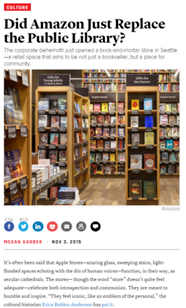 Have Ayn Rand worshippers turned the venerable Atlantic into a libertarian house organ? The magazine’s Megan Garber is out with a bizarre piece headlined Did Amazon Just Replace the Public Library?
Have Ayn Rand worshippers turned the venerable Atlantic into a libertarian house organ? The magazine’s Megan Garber is out with a bizarre piece headlined Did Amazon Just Replace the Public Library?
No, in writing up Amazon’s new Seattle store for the Atlantic’s Web site, Ms. Garber is not saying outright, “Let’s get rid of public libraries. Down with evil statist institutions.” But as a Princeton-educated graduate of the Columbia School of Journalism, she is doing a masterful job of showing how out of touch the members of the American media elite can be at times with the needs of the rest of the country. Let me be charitable. I’ll assume that Ms. Garber isn’t anti-library or even a libertarian—just a tad careless and superficial in this particular case.
 “Amazon Books is a store doing the work of a cultural institution,” Ms. Garber rejoices. “It’s about commerce, yes, but it’s also about collectivity. It is, in form if not in name, a library. And its librarians are the same people who serve as curators for amazon.com: fellow customers.” Is Amazon going to provide books for free, however? Ms. Garber at least observes that the model is sales, not loans. But that’s just the tip of the iceberg. Will the Amazon store really replace public libraries as a commons for not just the well-off but also the rest of America? How about face-to-face reference services for the poor and the old, especially those who are ill at ease with technology? And why must she trot out words like “cathedral” without exploring the full implications here? Oh, well, George Babbitt would approve.
“Amazon Books is a store doing the work of a cultural institution,” Ms. Garber rejoices. “It’s about commerce, yes, but it’s also about collectivity. It is, in form if not in name, a library. And its librarians are the same people who serve as curators for amazon.com: fellow customers.” Is Amazon going to provide books for free, however? Ms. Garber at least observes that the model is sales, not loans. But that’s just the tip of the iceberg. Will the Amazon store really replace public libraries as a commons for not just the well-off but also the rest of America? How about face-to-face reference services for the poor and the old, especially those who are ill at ease with technology? And why must she trot out words like “cathedral” without exploring the full implications here? Oh, well, George Babbitt would approve.
Since Ms. Garber presumably knows how to use a computer herself, perhaps she can go online and look up A Library Writes Its Own Story and Not Your Mother’s Library: How Columbus, Ohio, is building a community space for the 21st century, both by Atlantic Contributing Writer Deborah Fallows. I know Deb and her husband, Jim, and they graciously invited me to offer comments for the Columbus essay. I responded with a LibraryCity post titled The Six Top Library Issues—from the Amazon Threat to the need for a National Digital Library Endowment.
My Issue #1 was “whether public libraries will even exist half a century from now.” Little did I dream that the Atlantic would worsen the threat with a PRish tribute to an Amazon store. It is fine to broach the existential question that I did, or even to praise the many positives of the store despite the downside reported by Ars Technica in Amazon’s first brick-and-mortar store: One big ad for the Amazon app. It is not so admirable to compare the store and a library without more thoughtfully noting the differences as well as the need for the latter. Like a silly Associated Press article that downplays the existence of The Digital Divide, Ms. Garber’s essay will make it a little harder for me to promote the idea of a national digital library endowment (discussed in The Chronicle of Philanthropy, Education Week and Library Journal—direct links just given). Why worry about public libraries, much less the endowment? Let’s all rely on Amazon.
The good news is none other than the New York Times may have provided me with a tailwind by way of an article headlined The Digital Disparity Facing Lower-Income Teenagers and a follow-up blog item headlined Daily Report: The Entrenched Digital Divide in Our Own Backyards. I hope that Ms. Garber and Deb and Jim will read not only the Times items but also a report from Common Sense Media (note: registration with Common Sense possibly required).
“There is a large ‘digital equality gap’ in ownership of computers, tablets, and smartphones,’” the report says. “’Children in lower-income families are significantly less likely than their wealthier peers to live in homes with digital technologies. For example, 54 percent of lower-income teens (whose families make less than $35,000 a year) have a laptop in the home, compared with 92 percent of higher-income teens ($100,000 a year or more). One in 10 lower-income teens has only dial-up Internet at home, compared with none of the higher-income teens in our sample. And lower-income teens are much less likely to have their own smartphones as well (51 percent, compared with 78 percent of higher-income teens).” Unlike the Associated Press article, the report not only talks about devices but also the different ways in which the affluent and nonaffluent use them—with the latter using them more for entertainment than the well-off do.
The Common Sense report highlights gender-related differences as well as socioeconomic ones. Only five percent of surveyed teenaged boys, for example, say reading is their favorite form of media. By contrast, 14 percent of girls do.
Mightn’t public libraries play a role in addressing these differences through such activities as cell phone book clubs? And mightn’t a national digital library endowment help libraries reinvent themselves to better serve both genders and all socioeconomic classes in the digital era? Simply put, instead of writing an Onion-surrealistic article confusing the roles of Amazon and public libraries, Ms. Garber should be educating her readers about the need for a library endowment of the kind I proposed in Jim Fallows’s Atlantic blog. It would be a good way to redeem herself in the wake of the current debacle, about which my memory will be very short if she responds appropriately.
Related: Nate Hoffelder’s excellent analysis of The Atlantic piece, as well as TeleRead Editor Chris Meadows’s take on the store.
Detail: Actually some objectivists and libertarians may be more clueful about public libraries than Ms. Garber is in her recent commentary. While libraries are government agencies, they are a wonderful way of tracking down the misdeeds of other public institutions—whether or not you’re well off. So in that sense, yes, you can still be libertarian and pro-library.
Also of interest: In “A Library Writes Its Own Story,” Deb says: “In Redlands, the library could lean on its endowment, established by a far-sighted citizenry in the 1920s, to supplement support for salaries and services normally covered by the (thinning) city coffers.” Would that all cities and states enjoy access to the brains and resources to set up major endowments! That is why we need a national approach, especially given the ease with which libraries can share digital resources (with proper precautions in place, of course, for compensation of content and services providers).





























It occurs to me that the article may be symptomatic of the decreased importance of paper books in general in this digital world with so many more things to occupy people’s attention than books. If you were to take the checking-out of books out of the picture, then what’s left for a library to be but a community center?
For that matter, any decent library these days does considerably more than just check out books. It provides access to the Internet and to many other community resources, a place for people to reserve conference rooms to meet and discuss subjects that may not even have anything to do with books, and access to other non-book tools and materials that individuals may not be able to get to any other way. (That discussion of “library as sandbox” from the panel I attended on Gen Con Trade Day comes to mind.)
For that matter, there are now libraries that don’t have any (physical) books at all. And you said at the time that you were glad to see more coverage of them. 🙂
I can see how, if you discount checking out books, the Venn diagram of overlap between an Amazon store and a library could be larger. For that matter, without books, there’s a lot of overlap between all sorts of places and a library—coffeeshops, LAN-game computer rental shops, community centers, and so on.
(It’s also worth noting that the concept of the “public library” is itself a very recent invention, and before the mid-19th century they didn’t exist as such and circulating libraries were for-profit organizations that rented or sold reading material. But I doubt that such a comparison was in Ms. Garber’s mind when she wrote the article for The Atlantic.)
@Chris: Yes, long term, e-books will be the big show. And I love, love, love what Bibliotech is doing–with some reservations. I would like to see paper books available for kids.
As for libraries vs. Amazon, I acknowledge some similarities. My problem with the Atlantic article is that it more or less neglected the dangers of the Amazon model replacing the public library one. Also it focuses on “community” among the affluent as opposed to “community” at large.
Regarding the fact that public libraries haven’t always existed–why, yes, that’s true. But for most of the life of the U.S. as a country, they have. Amazon could never replace them as a promoter of books for kids in bookless homes.
Public libraries, furthermore, are vital as civic institutions. Besides, is the past always that great an example? Time to abolish public libraries and bring back slavery? I doubt you’d think that. But you can see the point I’m making.
Thanks,
David
“Ayn Rand Worshippers”, LOL.
I don’t think she is one but that was still a good joke.
@Nate: Agreed that she isn’t. I thought it was clear that I was not portraying her as a government- or library-hater. I’ve tweaked the copy to be still clearer. David
David, I was just giggling at the title.
@Nate: Forgive the smugness but I liked it too 😉 As for being clear, I’ll leave in the strengthened clarification since I don’t know if Princeton or Columbia offers Sense of Humor 101. So far nothing from Ms. Garber as far as I know. I guess she’s in a broadcast mode. Anyway, good commentary at your end! Too bad that the journalists on Mt. Olympus aren’t paying attention.
I propose a test to answer the question posed by her headline:
1) Go to Amazon store.
2) Ask staff member to help you find sources for your term paper.
3) If staff member doesn’t call security and actually helps you do that, try to check sources out and take them home without paying anything.
Predicted conclusion: No, this won’t replace the public library.